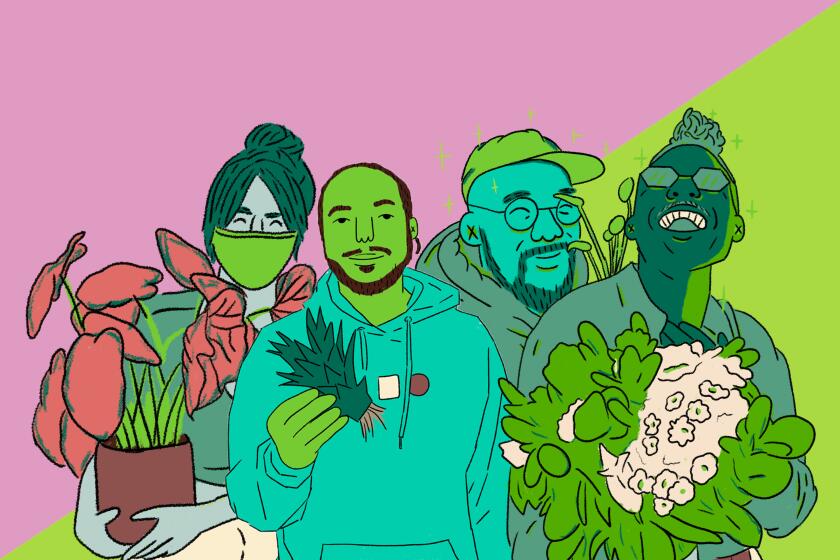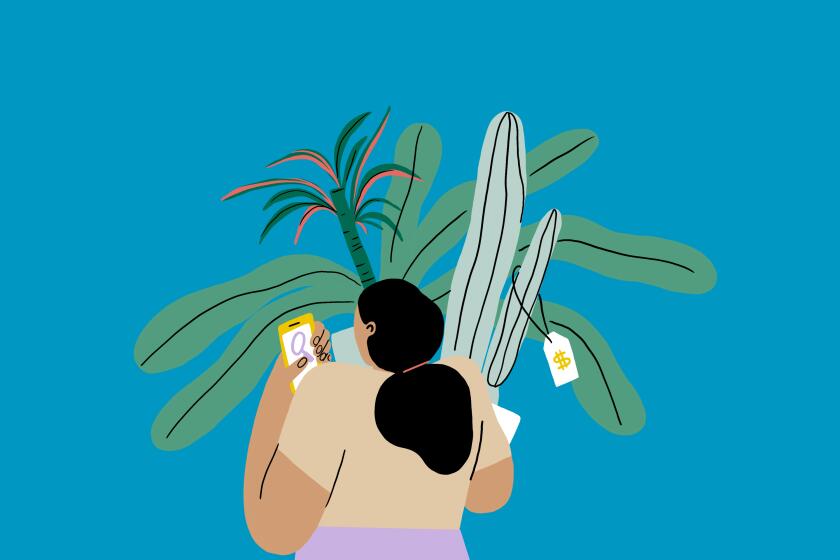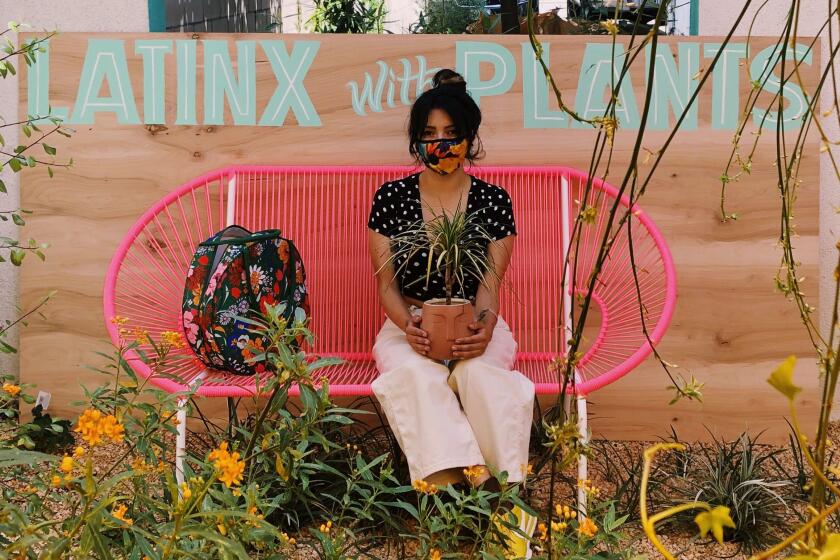The secret behind this queer, Latinx-owned plant shop is 4 words: Come as you are
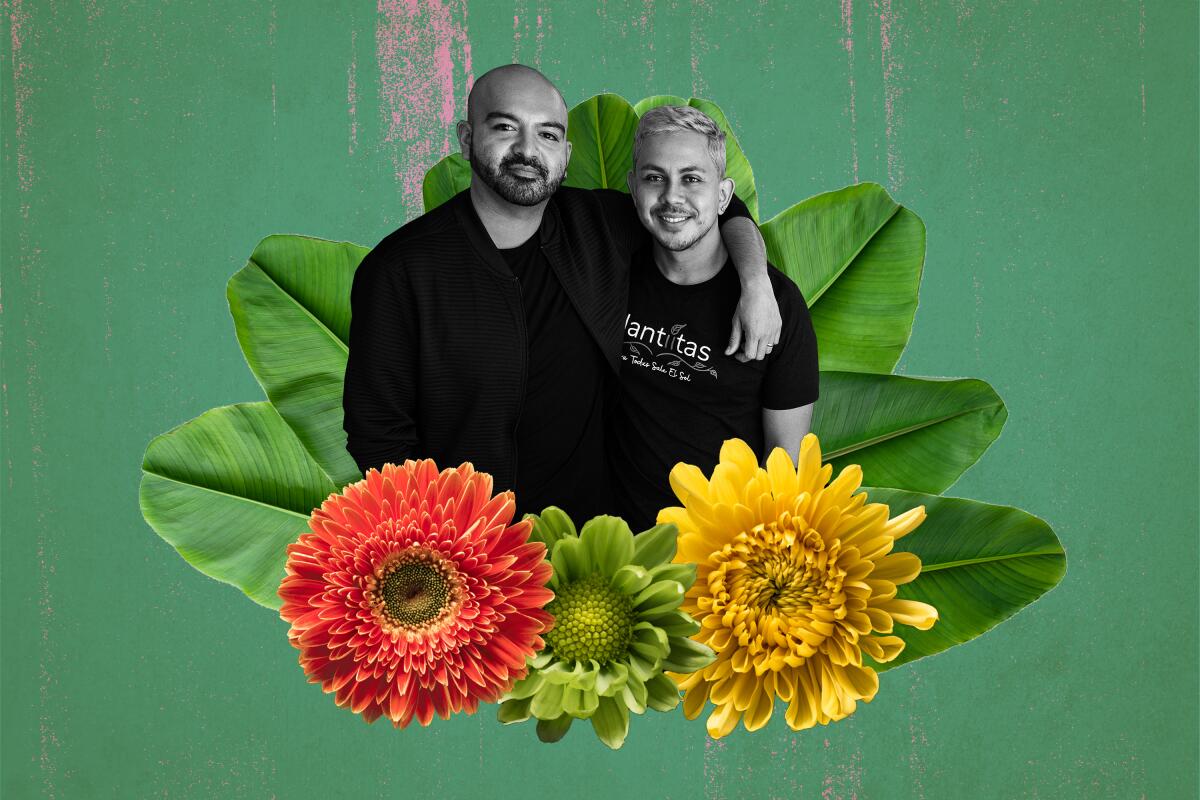
- Share via
On a recent morning, the fog outside in Long Beach is thick, but the vibes inside Kevin Alcaraz and Anthony Diaz’s spacious shop, Plantiitas, are bright and welcoming. There’s a statue of La Virgen perched high for protection. A sea of green plants — including Oxalis triangularis and maranta lemon lime prayer plants, Alocasia ‘Silver Dragon’ and Hoya engleriana — is spread across three large wooden tables made by local artisan Sarven Manguiat. A progress Pride flag hangs on the front door, and a large mural on the back wall reads “Para Todxs Sale el Sol” — the sun comes out for everyone.
In our Plant PPL series, we interview people of color in the plant world, including plantfluencers, plant stylists, floral artists, enthusiasts, experts and garden store owners.
Compared with other minimal and pricey plant boutiques in town, Plantiitas seems to say, “Yes, you can breathe near the plants.” But it also says, “Come as you are.” Alcaraz, a freelance makeup artist, immigrated to this country from Mexico when he was 18. Diaz, the founder of an ASL interpreting service, is first-generation Mexican American. “I wanted to have something that said, ‘They are not ashamed to be brown,’” Alcaraz, 27, says. “Also I want it to be a place where people feel safe.”
Their approach has been transformative. The couple’s plant shop has had long lines since it opened last fall. So much so that their neighbors sometimes joke that they must be selling something harder than pothos. “For us to describe the feeling of love and support and just warmth that we’ve received ... it’s been mind-blowing,” Diaz, 31, says. “It’s been overwhelming.”
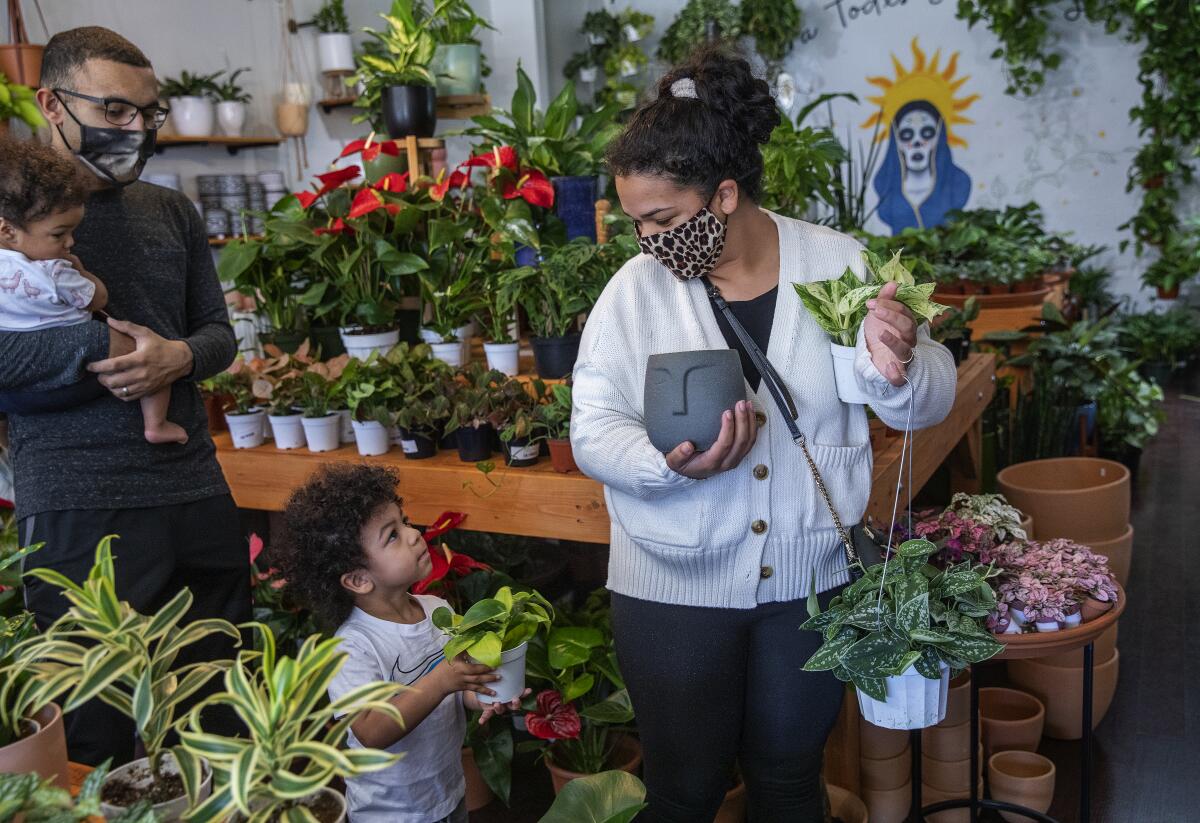
‘God is our permit’
Alcaraz is the visionary in the relationship, Diaz is the practical one. The couple met at a gym in Huntington Park and have been married for five years. Opening a plant shop is not something they had planned — or even thought possible — before last year.
“Black- and brown-owned plant businesses,” Diaz says, “there aren’t a whole lot.”
Plantiitas started with a one-off post on Facebook. Alcaraz had a couple of houseplants that were thriving, so he repotted them and put them in a macramé hanger he made in quarantine. He posted an image of the plants early in the pandemic, and they sold immediately. Then he began posting and selling more plants, eventually saving up $1,000. Alcaraz took that money and bought a truckload of plants and pots that he planned to sell on two tables and a rack outside his and Diaz’s garage.
“I said to Anthony, ‘We’re going to sell everything or we’re going to have a jungle.’”
They advertised the sale on social media for a Saturday last May. Within one day, every plant was sold.
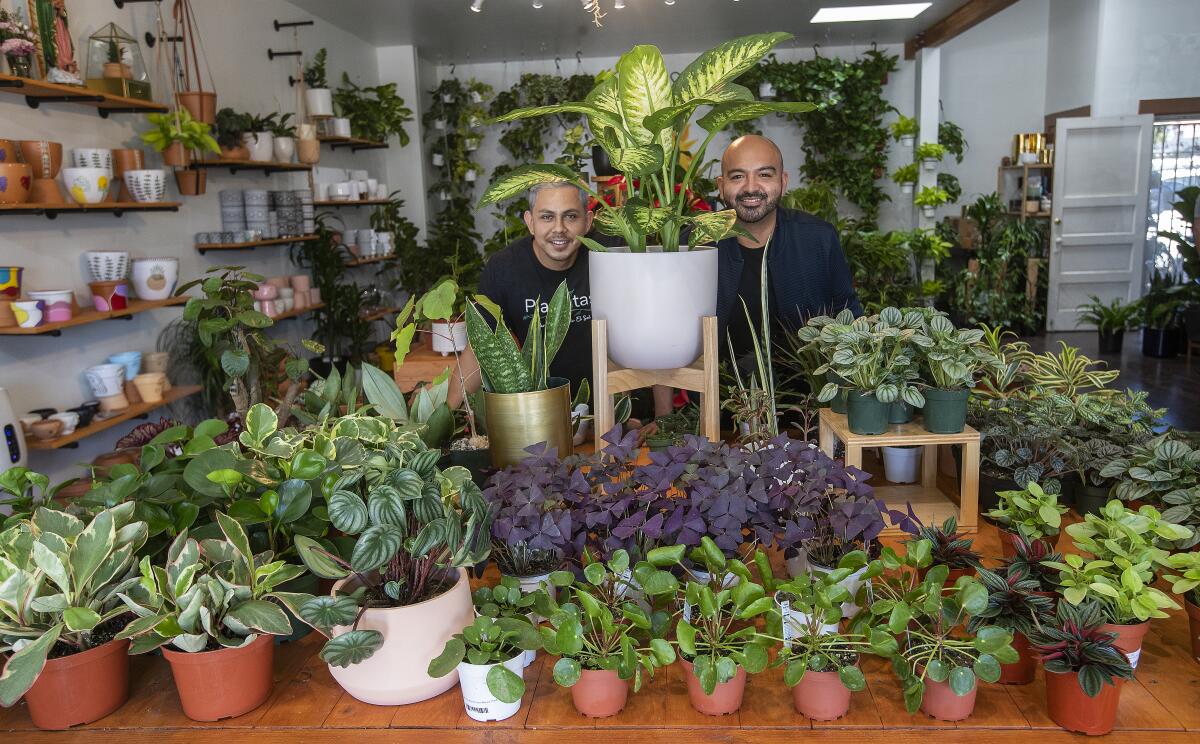
Both Diaz and Alcaraz’s jobs had dried up because of COVID, so they began focusing on their new venture full time. They grew it from a couple of tables outside to a garage filled with greenery and open for business every Saturday and Sunday. Swarms of masked people, newly obsessed with plants during the pandemic, were showing up — and demand only grew.
“It got to the point where we had people lining up along our driveway just to get to our garage,” Diaz says.
As plant stores begin to reopen in Los Angeles, we share a few of our favorites.
There were also a few naysayers.
“We had some Karens coming and asking [as they were buying plants], ‘Do you have permits to do this?’” Alcaraz remembers, “and I was like, ‘We do. God is our permit.’”
Before long, though, Alcaraz and Diaz knew it was time to look for an official space. Somewhere they could stretch out and not have to worry about the city busting them — or violating social distancing guidelines. Besides, they were over the struggle of lugging their supply from their third-floor apartment to their first-floor garage every weekend.
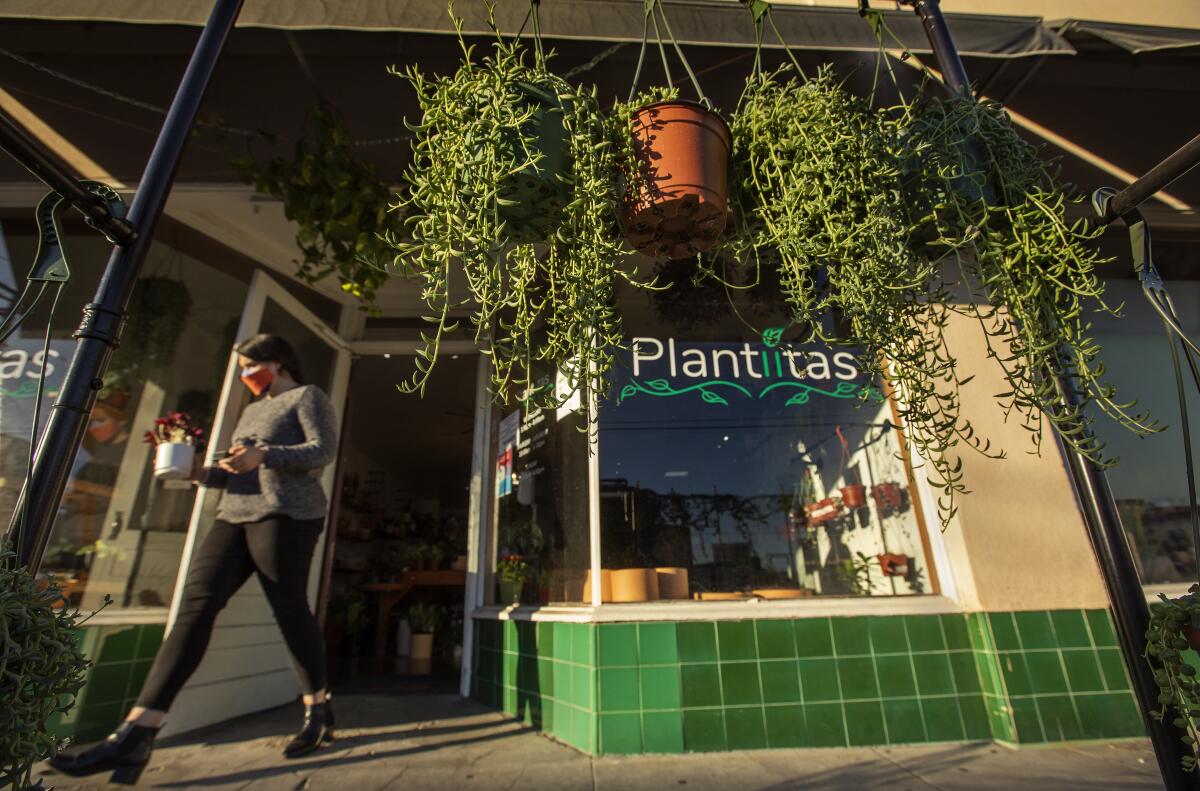
Plantiitas’ home on a sleepy stretch of 4th Street was the first storefront they applied for.
In a subconscious way, the couple had been preparing for this moment their entire lives. Diaz grew up in Southeast L.A., tending to his grandparents’ garden. Alcaraz was born and raised in a small town in Jalisco, Mexico, called Margaritas (“small town, big chisme,” he jokes), where his family owned orchards and his grandmother helped cultivate his green thumb by talking to her plants every morning.
But being business owners of color working in the plant world brought with it a specific set of challenges. They didn’t have immediate access to capital. They didn’t have the “linguistic knowledge of what a business is and how to set it up,” Diaz says. Basics, like “not knowing the idea of purchasing as a company versus purchasing as a customer. All of those things are things that nobody lays out for you.
“The other stores aren’t going to want to share those secrets with you. I can’t tell you how many hours Kevin invested driving to different greenhouses to just show up, to ask questions, to feel powerless and hopeless until things started falling into place.”
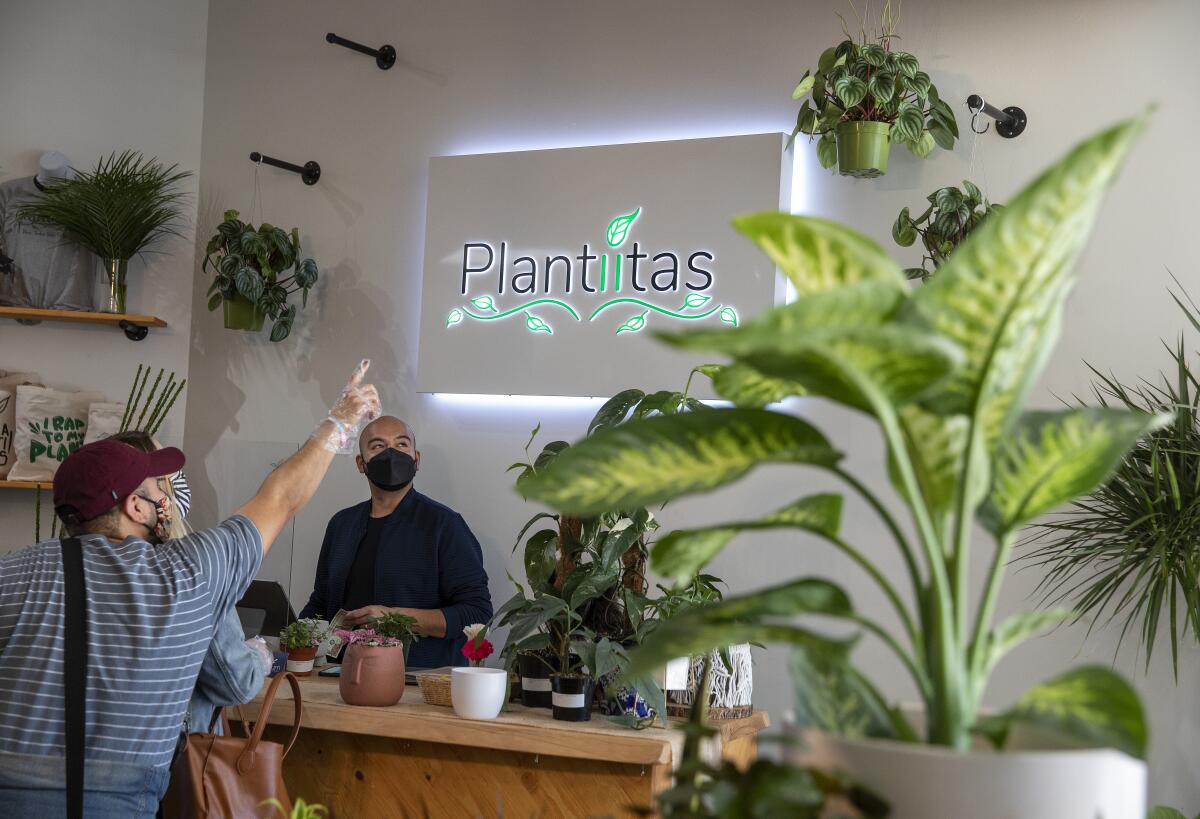
These hurdles frustrated Diaz and Alcaraz but made them even more dedicated to operating a shop that is of the Long Beach community and for the Long Beach community. That meant centering the shop in the experiences of Long Beach’s queer and Latinx population.
For Diaz, that means prioritizing the mental health of people of color.
Early on in the pandemic, when he was struggling with anxiety, depression and PTSD, he turned to plants. They became a lesson in self-care. Plants needed water and so did he. Plants needed sun and so did he. The plants needed to be treated kindly and so did he.
Andi Xoch, creator of @LatinxWithPlants hosts plant pop-ups on the weekends outside her home in Boyle Heights
Diaz thinks Plantiitas can offer the same for others — not only by selling plants but by hosting community healing events.
Prices are affordable. Small common plants in the shop start at $3, while the rare niche ones can sell for up to $300. But a solid chunk of them range between $10 and $30.
“I came with probably $100 to this country, so I had to work really hard to buy some things,” Alcaraz says. “I didn’t want people to be like I was going to a store and just checking everything out and saying, ‘One day.’ No. The day they come is the day I want them to take something home.”
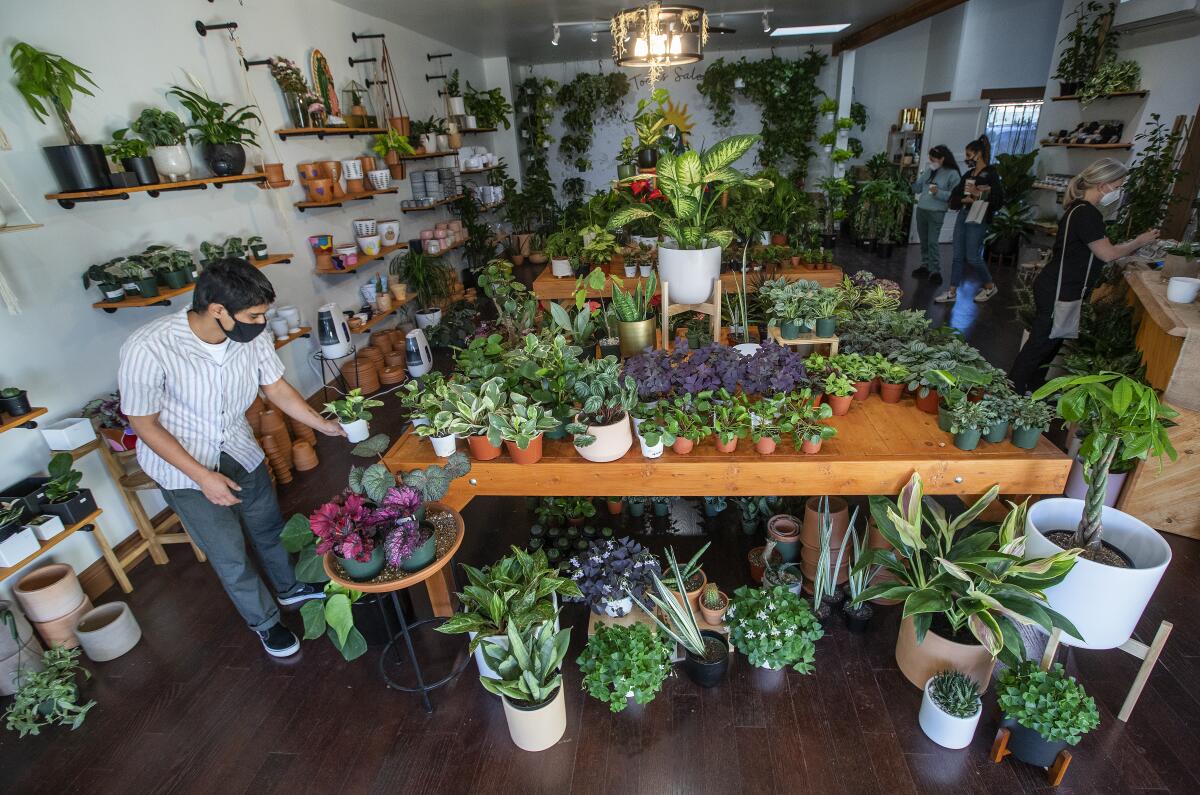
Working with local artists is another important part of the equation. The mural that has become synonymous with Plantiitas is a remixed take on La Catrina, a Mexican symbol tied to Día de Muertos. It was painted by Long Beach artist Karina Vazquez, who was born in Guadalajara.
“Seeing how much they were doing with what they had, I really admired them for that,” Vazquez says about working with the couple. “And also knowing that they’re Mexican, I was like, ‘My people.’”
The feminine image Vazquez painted features a thin handlebar mustache in a nod to queerness, with a sun behind the figure’s head and vines for arms, intended to welcome all people into the space.
It’s working. One Plantiitas customer, Amanda Demaray, 31, says she comes to the shop weekly and has done so since it opened in October.
“The whole vibe is just … ,” says Demaray, lifting her hands to the sky, gesturing at some intangible energy. “I like to come when I’m not in the best mood, and it totally changes my day.”
More to Read
Sign up for The Wild
We’ll help you find the best places to hike, bike and run, as well as the perfect silent spots for meditation and yoga.
You may occasionally receive promotional content from the Los Angeles Times.
